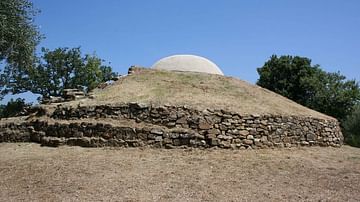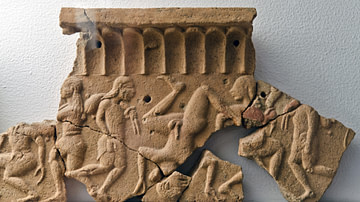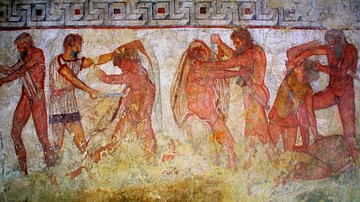Search Definitions
Browse Content (p. 211)

Definition
Gallienus
Gallienus was Roman emperor from 253 to 268 CE. Publius Licinius Egnatius Gallienus, the eldest son of Emperor Valerian, was named co-emperor by his father in 253 CE. He was one of many who would claim the throne over the next two decades...

Definition
Nanna
Nanna (also known as Nannar, Nanna-Suen, Sin, Asimbabbar, Namrasit, Inbu) is the Mesopotamian god of the moon and wisdom. He is one of the oldest gods in the Mesopotamian pantheon and is first mentioned at the very dawn of writing in Sumer...

Definition
Vetulonia
Vetulonia (Etruscan: Vetluna), located in the hills near the western coast of central Italy, was an important Etruscan town from the 9th to 3rd century BCE. The site has many impressive tumulus tombs which were rich in artefacts illustrating...

Definition
Villanovan Culture
The Villanovan culture flourished during the Iron Age in central Italy from c. 1000 to c. 750 BCE. It was a precursor of the Etruscan civilization, although the two populations are actually the same and the term Villanovan should not imply...

Definition
Acquarossa
Acquarossa, located in the north of Italy's Lazio region, is the site of an Etruscan settlement of unknown name. Although much smaller than other, more famous Etruscan towns, Acquarossa has proved invaluable for archaeologists as it has not...

Definition
Ninurta
Ninurta (identified with Ningirsu, Pabilsag, and the biblical Nimrod) is the Sumerian and Akkadian hero-god of war, hunting, and the south wind. He first appears in texts in the early 3rd millennium BCE as an agricultural god and local deity...

Definition
Ancient Crete
Crete is an island in the eastern Mediterranean which during the Bronze Age produced the influential Minoan civilization with its distinctive architecture and art. An important member of the Greek world in the Archaic period, Crete dipped...

Definition
Pazuzu
Pazuzu is an Assyrian/Babylonian demonic god who was most popular in the first millenium BCE. He was the son of Hanbi (also Hanba), king of the demons of the underworld, and brother to Humbaba, the demon-god protector of the Cedar Forest...

Definition
Francois Tomb
The Francois Tomb is an Etruscan tomb located at Vulci (Velch to the Etruscans), a town located 12 km from the western coast of central Italy, by the banks of the Fiora River. Flourishing as a trading port between the 6th and 4th century...

Definition
Utu-Shamash
Utu (also known as Shamash, Samas, and Babbar) is the Sumerian god of the sun and divine justice. He is the son of the moon god Nanna and the fertility goddess Ningal in the Sumerian tradition but was known as Shamash (Samas) to the Akkadians...